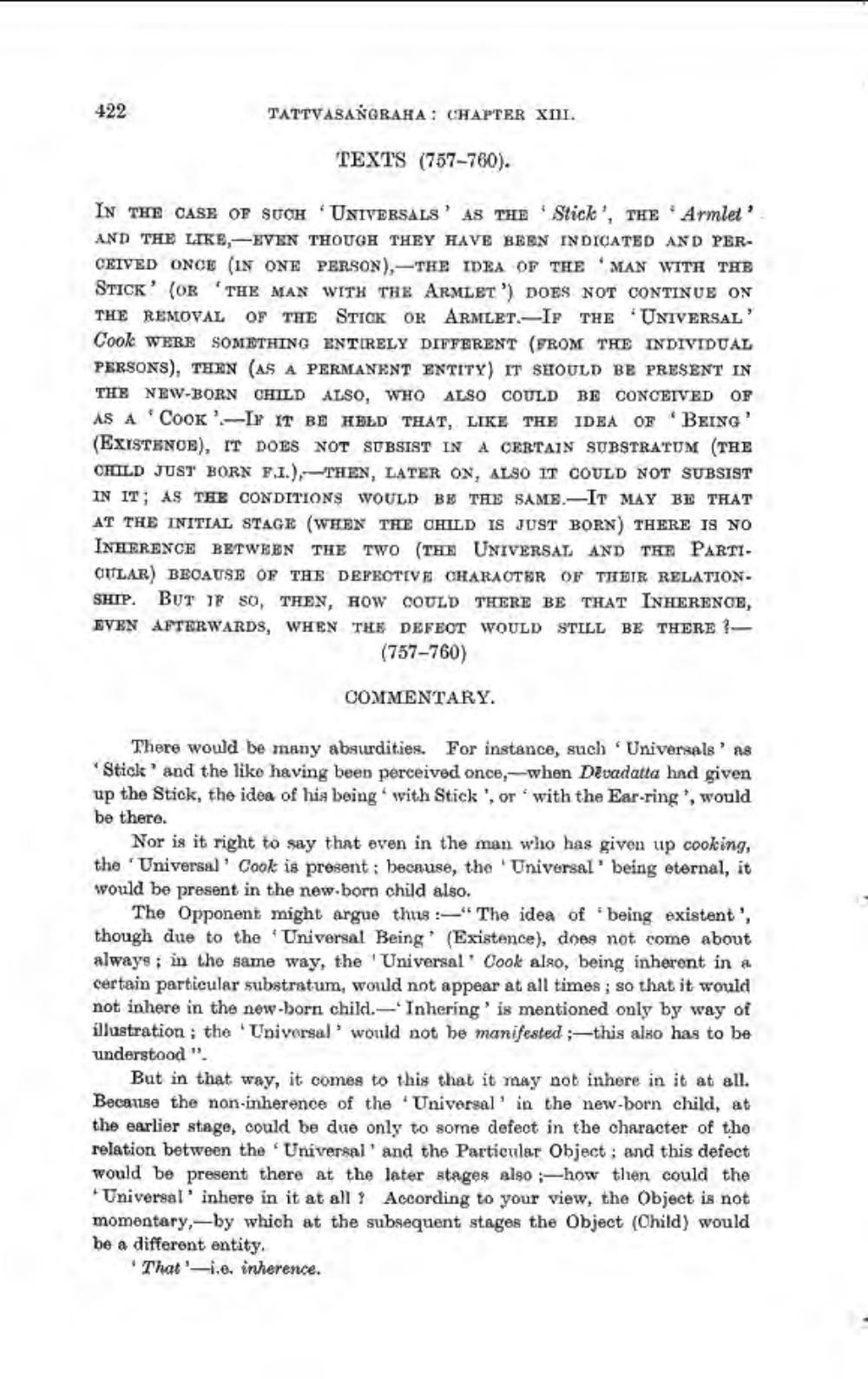________________
422
TATTVASANGRAHA: CHAPTER XI.
TEXTS (757-760).
IN THE CASE OF SUCH UNIVERSALS' AS THE 'Sticle', THE Armlet' AND THE LIKE,-EVEN THOUGH THEY HAVE BEEN INDICATED AND PERCEIVED ONCE (IN ONE PERSON),—THE IDEA OF THE MAN WITH THE STICK' (OR THE MAN WITH THE ARMLET') DOES NOT CONTINUE ON THE REMOVAL OF THE STICK OR ARMLET. IF THE UNIVERSAL Cook WERE SOMETHING ENTIRELY DIFFERENT (FROM THE INDIVIDUAL PERSONS), THEN (AS A PERMANENT ENTITY) IT SHOULD BE PRESENT IN THE NEW-BORN CHILD ALSO, WHO ALSO COULD BE CONCEIVED OF AS A Cook'-IT IT BE HELD THAT, LIKE THE IDEA OF BEING' (EXISTENCE), IT DOES NOT SUBSIST IN A CERTAIN SUBSTRATUM (THE CHILD JUST BORN F.I.),THEN, LATER ON, ALSO IT COULD NOT SUBSIST IN IT; AS THE CONDITIONS WOULD BE THE SAME. IT MAY BE THAT AT THE INITIAL STAGE (WHEN THE CHILD IS JUST BORN) THERE IS NO INHERENCE BETWEEN THE TWO (THE UNIVERSAL AND THE PARTICILAR) BECAUSE OF THE DEFECTIVE CHARACTER OF THEIR RELATIONSHIP. BUT IF SO, THEN, HOW COULD THERE BE THAT INHERENCE, EVEN AFTERWARDS, WHEN THE DEFEOT WOULD STILL BE THERE 1
(757-760)
COMMENTARY.
There would be many absurdities. For instance, such Universals' as Stick' and the like having been perceived once, when Devadatta had given up the Stick, the idea of his being with Stick', or with the Ear-ring', would be there.
Nor is it right to say that even in the man who has given up cooking, the Universal' Cook is present : because, the Universal' being eternal, it would be present in the new.born child also.
The Opponent might argue thus :-" The idea of being existent, though due to the Universal Being' (Existence), does not come about always; in the same way, the Universal' Cook also, being inherent in * certain particular substratum, would not appear at all times ; so that it would not inhere in the new-born child.-Inhering' is mentioned only by way of illustration ; the Universal' would not be manifested this also has to be understood ".
But in that way, it comes to this that it may not inhere in it at all. Because the non-inherence of the Universal' in the new-born child, at the earlier stage, could be due only to some defect in the character of the relation between the Universal' and the Particular Object; and this defect would be present there at the later stages also ;-how then could the
Universal' inhere in it at all ? According to your view, the Object is not momentary,-by which at the subsequent stages the Object (Child) would be a different entity.
That'-i.e. inherence.




